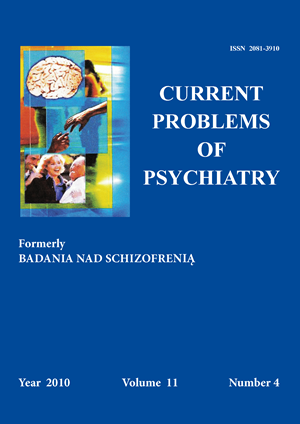E-freedom, or e-enslavement. Analysis of websites that promote anorexia as a lifestyle
Keywords:
Internet, eating disorders, pro-Ana, pro-MiaWeb sitesAbstract
Anorexia is a disease with the highest mortality rate among all mental diseases. Treatment of this disorder is especially difficult because in most cases patients show lack of willingness to get out of the illness. The reason of their approach is the feeling of being alienated from the society and persuasion of anorexia being not a disease but conscious lifestyle. The number of websites uniting people with eating disorders has grown significantly in the previous decade. Most of the websites propagate anorexia as an ideology and way of life, while minority of them offer support in struggle with the disease. The information about getting extremely low body weight presented on pro-ana websites can be dangerous for young women with low self esteem and unsettled body image. Universality and accessibility of the Internet are the reasons why the majority of the people with eating disorders are using the pro-ana websites nowadays. Preliminary analysis of the websites indicates that it can be the source of a positive support but on the other hand can also motivate to exacerbate the dieting regime. The aim of the article is to show the reality of hermetic pro-ana world in the Internet. The influence of the Internet societies on development of eating disorders has been poorly examined till now and the struggle with pro-ana movement has created only negative effects such as passwords and protections against unwelcome guests. The question is how professionals can make a convenience of websites’ content to fight with eating disorders and to create a therapy which can be much more effective.
References
1. Overbeke G. Pro-Anorexia Websites: Content, Impact, and Explanations of Popularity. Mind Matters: The Wesleyan Journal of Psychology, 2008; 3: 49-62.
2. Fox N., Ward K., O’Rurke A. Pro-anorexia, weight-loss drugs and the internet: an ‘anti-recovery’ explanatory model of anorexia. Sociol. Health Illn., 2005; 27(7): 944-971.
3. Mulè A, Sideli L. Eating Disorders on the Web: Risks and Resources. Stud. Health Technol. Inform., 2009; 144: 8-12.
4. Wilson J.L., Peebles R., Hardy K.K., Litt I.F. Surfing for Thinness: A Pilot Study of Pro-Eating Disorder Web Site Usage in Adolescents With Eating Disorders. Peadiatrics, 2006; 118: 1635-1643.
5. http://maigrelet.mojeforum.net/temat-vt2.html
6. http://www.porcelainbutterflies.fora.pl/regulamin,26/regulamin-forum,605.html
7. http://www.proanamotyle.pun.pl/forums.php
8. Dias K. The Ana Sanctuary: Women’s Pro-Anorexia Narratives in Cyberspace. J. Intern. Women’s Studies, 2003; 4: 31-45.


